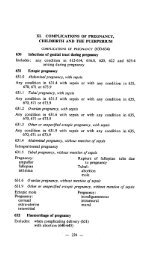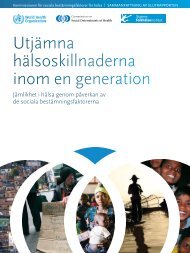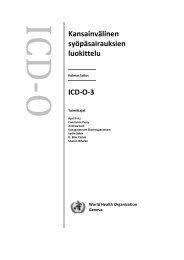MENTAL HEALTH AND DEVELOPMENT: - libdoc.who.int - World ...
MENTAL HEALTH AND DEVELOPMENT: - libdoc.who.int - World ...
MENTAL HEALTH AND DEVELOPMENT: - libdoc.who.int - World ...
You also want an ePaper? Increase the reach of your titles
YUMPU automatically turns print PDFs into web optimized ePapers that Google loves.
1.Introduction<br />
community, to ensure that national and <strong>int</strong>ernational development programmes<br />
are inclusive of and accessible to people with disabilities.<br />
This report on mental health and development brings together data and information<br />
from diverse sources ranging from cases studies, the United Nations (UN),<br />
development agencies, governmental and nongovernmental reports through to<br />
systematic reviews of the literature to demonstrate that development outcomes<br />
would be enhanced substantially through targeting people with mental health<br />
conditions as a vulnerable group. People with mental health conditions embody<br />
all major characteristics of vulnerability, and as such should receive development<br />
assistance. In addition, mental health concerns are prominent among other recognized<br />
vulnerable groups. By addressing mental health issues, both people with<br />
mental health conditions and other vulnerable groups will benefit.<br />
This report is divided <strong>int</strong>o several sections. Section 2 provides evidence to show<br />
that people with mental health conditions meet the criteria for being a vulnerable<br />
group. Section 3 looks at the situation from a different perspective, by describing<br />
how vulnerable groups traditionally targeted by development agencies – for<br />
example, women subjected to violence – also have high rates of mental health<br />
conditions. Section 4 explores solutions and provides recommendations for specific<br />
evidence based actions that would improve the lives of people with mental<br />
health conditions thereby improving development outcomes for individuals, their<br />
communities and their country. The final part of the report, Section 5, looks at<br />
possible contributions by different development stakeholders to address mental<br />
health conditions within the context of their policies and associated programmes.<br />
Mental health in low- and middle-income countries is the focus of this report, but<br />
the problems described are by no means confined to developing countries. The<br />
report also provides examples from all parts of the world from which solutions can<br />
be drawn. Examples from specific countries used to illustrate the different issues<br />
should not be viewed as assessments of countries’ overall mental health systems,<br />
nor should they be taken to mean that any country is more or less advanced than<br />
others in protecting the rights of people with mental health conditions.<br />
5

















